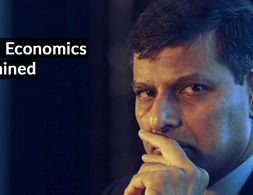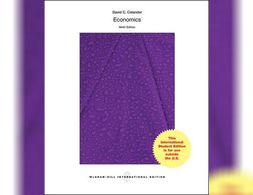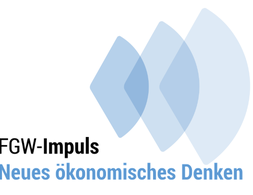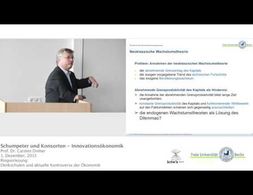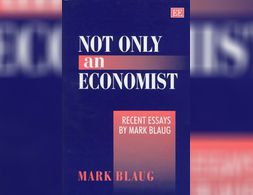862 Ergebnisse
In this short video 'Raghuram Rajan’s Dosa Economics Explained', the famous theory of Dr. Raghuram Rajan, ex-governor of Reserve Bank of India (RBI), Dosa Economics, has been explained using a very simple example of Dosa ( a delicacy of India). Here, Dr. Raghuram Rajan tries to explain that low interest rate and low inflation is much better than high interest rate and high inflation.
This Perspective argues that ergodicity — a foundational concept in equilibrium statistical physics — is wrongly assumed in much of the quantitative economics literature. By evaluating the extent to which dynamical problems can be replaced by probabilistic ones, many economics puzzles become resolvable in a natural and empirically testable fashion.
This brief responds to the criticism that mainstream economics is currently facing due to its heavy reliance on models and narrow range of quantitative research techniques. It takes a broader view, identifying issues that are also relevant for heterodox and pluralist approaches to economics.
Helps students succeed in the principles of economics course. This title offers trademark colloquial approach that focuses on modern economics, institutions, history, and modeling, and is organized around learning objectives to make it easier for students to understand the material and for instructors to build assignments within Connect Plus.
Economics: A New Introduction provides a fresh introduction to real economics. Highlighting the complex and changing nature of economic activity, this wide-ranging text employs a pragmatic mix of old and new methods to examine the role of values and theoretical beliefs in economic life and in economists understanding of it.
"This eleven-week course offers a pluralist introduction to political economy and economics. We will examine nine (9) competing schools of thought, each of which offer an original and distinctive illumination of economic and social reality. The course offers a level of learning that would at least match that which is offered by a University. However, you do not need to be connected to a university or to have studied political economy or economics previously to enrol in this particular subject."
This collection of videos offers a short introduction to ecological economics and its main differences with respect to environmental economics.
Health Economics traditionally involves two distinct strands. One focuses on the application of core neoclassical economic theories of the firm, the consumer and the market to health-seeking behaviour and other health issues. It suggests a role for government intervention only in the case of specific market failures (for example externalities, asymmetric information, moral hazard, and public goods) that distort market outcomes. The second strand is evaluation techniques, used to assess the cost effectiveness of competing health interventions.
This syllabus provides an overview of the contents of the course "The Philosophy and Methodology of Economics" at the Duke University
In this paper the main developments in post-Keynesian macroeconomics since the mid- 1990s will be reviewed. For this purpose the main differences between heterodox economics in general, including post-Keynesian economics, and orthodox economics will be reiterated and an overview over the strands of post-Keynesian economics, their commonalities and developments since the 1930s will be outlined. This will provide the grounds for touching upon three important areas of development and progress of post-Keynesian macroeconomics since the mid-1990s: first, the integration of distribution issues and distributional conflict into short- and long-run macroeconomics, both in theoretical and in empirical/applied works; second, the integrated analysis of money, finance and macroeconomics and its application to changing institutional and historical circumstances, like the process of financialisation; and third, the development of full-blown macroeconomic models, providing alternatives to the mainstream 'New Consensus Model' (NCM), and allowing to derive a full macroeconomic policy mix as a more convincing alternative to the one implied and proposed by the mainstream NCM, which has desperately failed in the face of the recent crises.
In the pluralist showcase series by Rethinking Economics, Cahal Moran explores non-mainstream ideas in economics and how they are useful for explaining, understanding and predicting things in economics.
In this essay the author reviews empirical studies in economics that analyze factors behind the rise of nationalist and populist parties in Western countries. He stresses that economic factors (e.g., trade shocks and economic crisis) play a crucial role in the rise of populist parties; however, the discussion of mechanisms driving this trend remains unsatisfying
After completing the workshop in Post Keynesian Economics participants should be able to describe the main differences and similarities between PKE and other schools of thought.
Completing the Economics of Discrimination module, the students should have acquired knowledge and understanding of the existing similarities and differences of the definition and analysis of discrimination across economic theory and cultural theory.
Auch wenn viele Ökonom_innen den Kritikpunkten zustimmen, wie die 2016 von dem Netzwerk Plurale Ökonomik und der Universität Kassel erstellte Studie EconPLUS aufzeigt, ändert sich die Lehre nur sehr langsam. Deswegen entstand im Netzwerk Plurale Ökonomik die Idee, selbst eine Online-Lehr- und Lernplattform zu pluraler Ökonomik zu erstellen. Diese Plattform Exploring Economics ging im Dezember 2016 online.
Carsten Dreher starts with a historical perspective on the development of evolutionary economics by mentioning the difficulties of neoclassical economics to explain economic growth and by referring to the work of Joseph Schumpeter. Then some concepts such as business cycles, path dependencies are shortly explained. Dreher continues by introducing two different approaches in evolutionary economics, a micro centred approach that is associated with Nelson and Winter's work and a macro institutional and historical approach that has been pursued amongst others by Chris Freeman. Lastly the policy implications of treating economies as innovation systems are discussed and a summary of the differences of neoclassical and evolutionary economics is provided.
A collection of the prolific economist's essays written since 1990, in sections on history of economic thought, methodology of economics, economics of education, cultural economics, and book reviews. Subjects include the work of Adam Smith, Hayek, and Keynes, the economic case for subsidies for the arts, the historiography of economics, and education and the employment contract. Annotation copyright by Book News, Inc., Portland, OR
Participants should be able to distinguish the strictly non-cooperative (methodological individualist) foundations of traditional neoclassical economics as being couched in self-interested individuals, as well as having basic knowledge of an alternative set of theories based on the primacy cooperation and social norms and extending the breadth of economic analysis beyond exchange.
The workshop deals with the contribution of Plural Economics to the urgently needed change of the economic system towards sustainability and global responsibility.
After completing the module, participants should be able to demarcate and explain different economic approaches to sustainability. They should be able to evaluate the respective concepts based on their contribution to the ecological transformation of the economic system.
Der Fokus der Komplexitätsökonomik liegt auf den Interaktionen und Wechselwirkungen zwischen Individuen und Strukturen wirtschaftlicher Systeme. Diese werden als Systeme organisierter Komplexität aufgefasst. Ein besonderes Augenmerk liegt auf der Analyse von Netzwerken.
This text summarizes the content of the 2018 Nobel Prize winner W. Nordhaus. It is extended by some critical perspectives on this topic. The short dossier gives an overview of the most important texts we have read in the climate economics reading group.
This guide contains a collection of recommended YouTube channels and YouTube videos in the fields of economics, business and economic policy.
Exploring Economics, an open-source e-learning platform, giving you the opportunity to discover & study a variety of economic theories, topics, and methods.
Exploring Economics, an open-source e-learning platform, giving you the opportunity to discover & study a variety of economic theories, topics, and methods.
This course introduces students to the relevance of gender relations in economics as a discipline and in economic processes and outcomes.
This syllabus provides an overview of the content of the Philosophy of Economics course at the University of Wisconsin-Madison.
Beyond Neoclassical Economics is a remarkable new introduction to the main heterodox schools of economic thought which examines their main concepts and their critiques of mainstream theory.
Exploring Economics, an open-access e-learning platform, giving you the opportunity to discover & study a variety of economic theories, topics, and methods.
Feminist economics critically analyzes both economic theory and economic life through the lens of gender, and advocates various forms of feminist economic transformation. In this course, we will explore this exciting and self-consciously political and transformative field.
This syllabus opens a literary overview of must-read papers in the field of development economics.
Economics has become a monolithic science, variously described as formalistic and autistic with neoclassical orthodoxy reigning supreme. So argue Dimitris Milonakis and Ben Fine in this new major work of critical recollection.
This course covers recent advances in behavioral economics by reviewing some of the assumptions made in mainstream economic models, and by discussing how human behavior systematically departs from these assumptions.
Wir nutzen Cookies. Klicke auf "Akzeptieren" um uns dabei zu helfen, Exploring Economics immer besser zu machen!

